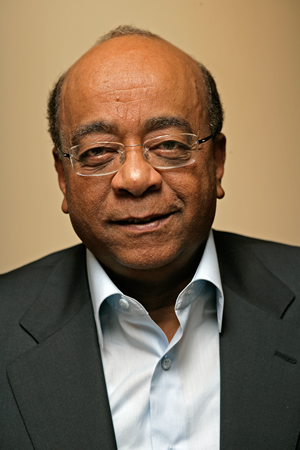
Mo Ibrahim, founder of Celtel International, one of Africa’s leading mobile telephone companies, gave the Coca-Cola World Fund at Yale Lecture on April 23. The title of his talk was “Governance, Leadership, Civil Society, and the Private Sector: An African Perspective” and he began it by rebuking the notion that Africa was poor.
“It has more than its share of natural resources; it has one billion people,” Ibrahim said. “So contrary to popular perception, Africa is not poor.” The problem that Ibrahim posed, rather, is why there exists such a “rich continent but such poor people?”
Ibrahim’s visit was his first at Yale. Sterling Professor of Political Science and Henry Luce Director of the MacMillan Center Ian Shapiro introduced Ibrahim to a packed Luce Hall Auditorium, and ran through Ibrahim’s accolades, which includes The Economist’s award for social and economic innovation. Ibrahim founded the Mo Ibrahim Foundation in 2006, which was launched to encourage good governance and leadership in Africa.
Ibrahim explained the impetus behind the Mo Ibrahim Index of African Governance, which rates countries’ governance according to 88 key criteria.
“Governance is about the delivery of public goods, from security to safety, to economic opportunity, to human rights, to the peaceful transfer of power,” Ibrahim said. “These are things that people expect from their government. And we need a scorecard to measure these deliverables. We need an objective, scientific measurement.”
This index would allow for more accountability, Ibrahim said. “When a child starves, who is responsible?” Ask the government, he added.
Ibrahim recalled Africa’s place in the world fifty years ago, when its income per head was higher than China, India and Malaysia’s. “What happened in the last fifty years that caused Africa to walk backward?” Ibrahim asked. He placed the Cold War as one of the leading factors in Africa’s slowdown, which he labeled as “even worse than colonialism.” The two superpowers, he said, developed client states and only cared about whether a state was theirs, not what went on inside them.
Good governance, Ibrahim said, can be enforced by good leaders. “Mozambique’s president came to power amid a civil war, and there was no end to the fighting,” Ibrahim recalled. “The president campaigned throughout the country to try and convince the armed groups to participate in the political process. And that saved the lives of millions of people.”
“What would happen in Syria if Bashar Al-Assad did that? These are real decisions that people make that can save lives,” Ibrahim said. He also stressed the importance of good leadership in the private sector, especially since most corruption involves the participation of corporations in tax evasion.
He also spoke about Africa’s future, which he believes is promising due to two critical groups: young people and women.
“Fifty percent of Africans are below 19 years old, which is the complete opposite of demographics in China and Europe,” Ibrahim said. “It’s a very interesting development and very important that we have a firm base of people to work. But it’s crucial to see that we give them adequate education and training. If we fail to do so, that will be a disaster. Tunisia and Egypt—these were countries that failed to provide these basic services, and they saw major upheavals.”
While these demographic statistics are promising, he was concerned about the unequal distribution of income, which would threaten the stability of the continent. “Africa is rising, economically, at about five percent per year, which is better than most of the world,” Ibrahim said. “I think that’s sustainable. One thing that worries me is inequality. If the rewards of economic development are not seen to be inclusive, we will run into a problem.”
The Coca-Cola World Fund at Yale Lecture is sponsored by the Whitney and Betty MacMillan Center for International and Area Studies, the Yale Law School, and the Yale School of Management.
